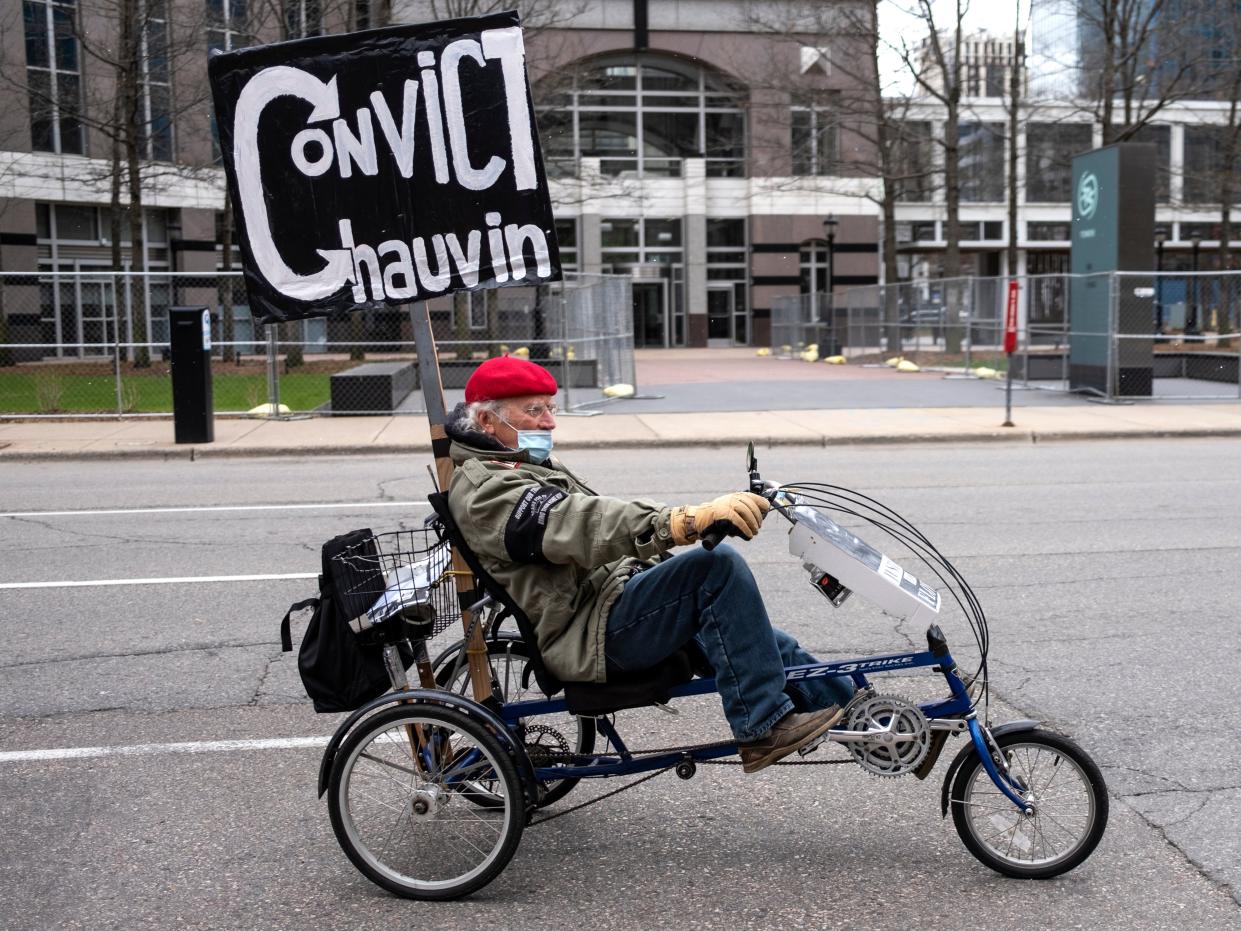Derek Chauvin trial: What are the possible outcomes?

Minneapolis braces for outcome in George Floyd murder trial
(Getty)- Oops!Something went wrong.Please try again later.
Closing arguments in the trial of Derek Chuavin for the killing of George Floyd are about to finish.
The 45-year-old is accused of restraining Mr Floyd for over nine minutes over a counterfeit bill, thereby causing the 46-year-old’s death in the custody of Minneapolis police.
The outcome of the trial – and arguably the future of US policing – will be decided by a jury of 12 after 15 days in the courtroom in Minneapolis, Minnesota.
The city was the location of the killing of Mr Floyd in May 2020, and with a final wait for justice imminent, the tension inside the courtroom – and out – is discernible.
What charges is Mr Chauvin facing?
Mr Chauvin faces charges of second-degree murder, third-degree murder and second-degree manslaughter.
Second-degree murder, the most serious of the charges, carries a maximum prison sentence of 40 years in Minnesota.
If jurors feel that Mr Chauvin did cause the death of Mr Floyd – unintentionally or intentionally – the former officer could spend the rest of his life in jail.
Third-degree murder, in comparison, carries a sentence of no more than 25 years, and/or a fine of no more than $40,000 (£28,596).
It means death caused by “an act eminently dangerous to others and evincing a depraved mind, without regard for human life”.
A third offence, of second-degree manslaughter, is the lowest of the offences facing the former officer, carrying a sentence of up to 10 years, and/ or a fine of no more than $20,000 (£14,298).
With no criminal record before the trial, it is likely that Mr Chauvin would serve just over 12 years for second or third-degree murder, if the jury convict, the Associated Press reported.
Crucially for campaigners, with few cases of police officers in the US being charged or convicted over deaths in custody, the outcome could implicate officers for future incidents.
There is, of course, the chance that no there is no conviction of Mr Chauvin for the death of Mr Floyd.
How long will it take to deliver a verdict?
Following the resting of the defence by lawyers for Mr Chauvin on Thursday, a judge told jurors to expect a lengthy deliberation.
Judge Peter Cahill told the twelve individuals that “If I were you, I would plan for long and hope for short,” adding: “whether it’s an hour or a week – it’s entirely within your province”.
Jurors will be given laptops and access to evidence presented by both sides in the case, as they deliberate, The New York Times reported.
Although a decision could come within hours of the start of deliberations, there is no way of telling how long it will take for a verdict to be reached.
A jury took 11 hours to convict former Minneapolis police officer Mohamed Noor of the 2017 killing of Justine Ruszczyk in 2017, according to MPR.
The officer received a verdict of third-degree murder and second-degree manslaughter – but not the more serious offence of second-degree murder.
Could there be a hung jury?
Yes, although it is reportedly uncommon.
LaJune Lange, a retired judge, told news outlet KARE 11 that it is "not that common,” and that the judge in Mr Chauvin’s trial could ask the jury to reconsider, if it is the case.
"So it would not be a short process," Ms Lange told the outlet. "That might be several days of deliberation before a jury would be brought into a judge saying that they have not been able to reach a unanimous verdict.”
In this case, it will likely take weeks for a verdict from the jury.
What if Mr Chauvin is not convicted?
A conviction of second or third-degree murder will likely result in celebrations among campaigners and activists of police reform.
No conviction or a conviction of manslaughter, in comparison, will likely result in protests in the city – almost 12 months after demonstrations were ignited by video of Mr Chauvin holding Mr Floyd down on the ground.
Following the fatal shooting of another Black man in Minneapolis last Sunday, 20-year-old Daunte Wright, tensions in the city are higher than before the start of the trial.
Buildings throughout the city are currently boarded-up, according to reports, with thousands of Minnesota National Guard troops on deployment – in case of unrest.
Read More
George Floyd’s brother has a message for America
Video shows Trump supporters going wild at Mar-a-Lago event
Right-wing Oath Keepers are being trained by police, leader claims

